耿建超英语语法---高频介词补充
Posted terrypython
tags:
篇首语:本文由小常识网(cha138.com)小编为大家整理,主要介绍了耿建超英语语法---高频介词补充相关的知识,希望对你有一定的参考价值。
1 表方向(东(east),西(west),南(south),北(north))
用到有in,on,to三个,具体的用法如下:
- in : 内部
- on : 接壤
- to : 隔海
举例:
- 广州在中国的南部。--- GZ is in the south of china.
- 广西在广东的东部。---GX is in the east of GD.
- 日本在中国的东部。---japan is to the east of china.
注:四个方向既是名词,又是副词,举例:往东走---go to the east===go east.
2 表方向(上下)
共有6组,见下图:
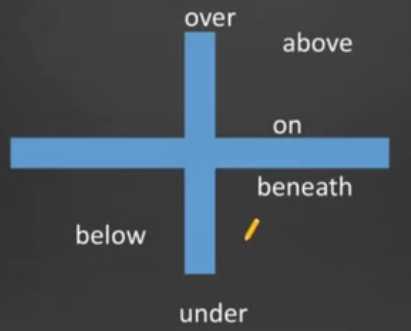
其中:
- over/under:表示正上正下
- above/below:表示斜上斜下
- on/beneath:表示物体表面的上下
注:(1)over,above有时区分不明显,举例如下:
我们将要飞过中国---we are going to fly over/above china.
(2)over除了表示正上方之外,还表示在物体表面的上方,与on的区别是:over表示覆盖。举例如下:
他用手捂住了脸---he puts his hands over face.
(3)数词,量词还可修饰a,adv,介词短语,还有表程度的词,举例如下:
我迟到了五分钟---i am five minutes late.
3 表方向(前后)
表前后的有八组,见下图:
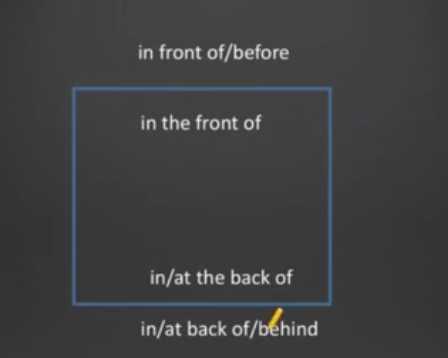
其中:in the front of / in/at the back of 表示物体内部的前后;in front of/before / in/at back of /behind 表示物体外面的前后。举例如下:
他站在车前---he is sitting in front of car.
教室后边有一块黑板---there is a blackboard in the back of classroom.
4 表周围和附近(5个)
共有5个表示附近的介词,距离远近不一样,先看下图大致了解一下,然后在解释:
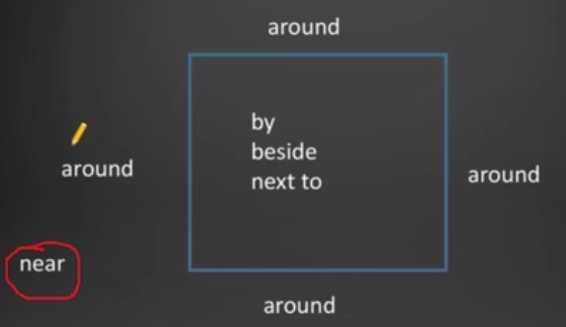
其中:
- by/besides/next to : 表示离的很近的时候使用
- near :近的时候可以使用,远的时候也可以使用,但一般表示远的。
- around ; 表示离的远的时候使用,且表示环绕的意思。
举两个例子:
1 我家附近有许多餐馆---there are many restaurant near/around my home.(around表示环绕着我家附近;near 表示 在我家附近的某一块)
2 电视挨着窗户呢!TV is by/beside/next to window.
5 表中间(3个)
between表示“两者之间”;among表示“三者及三者以上中间”;in the middle of 表示“三者及三者以上正中间”,图示如下:
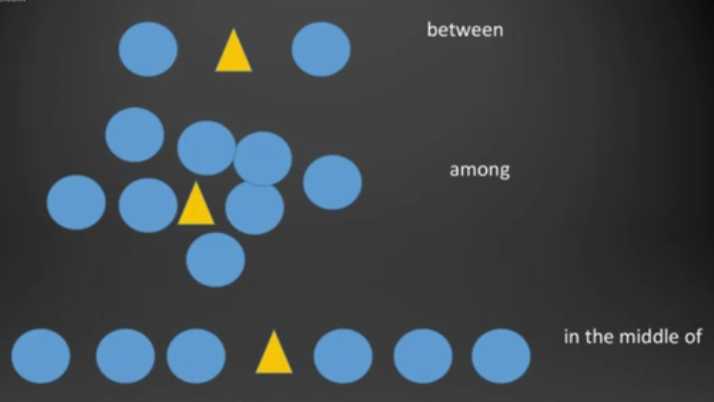
举几个例子体会一下:
- 他坐在我和我朋友中间---he is sitting between my friend and me.
- 他坐在孩子们中间---he is sitting among kids.
- 他坐在孩子们的正中间---he is sitting in the middle of kids.
6 表穿过
over表示从物体上方穿过(比如“从墙上穿过”);across 表示横穿(没有目的的穿过);past/by表示从物体旁边穿过。图示如下:
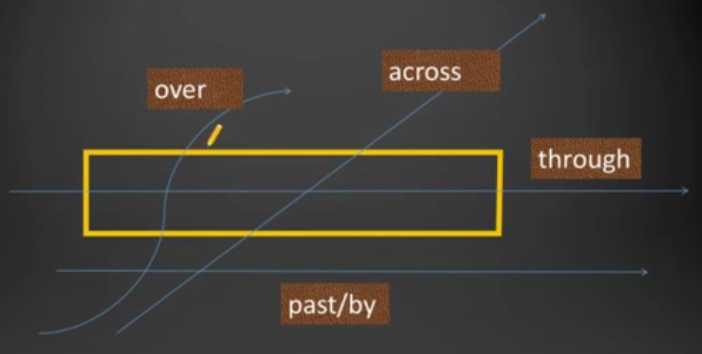
举几个例子:
- 他跑到了马路对面
he ran across the street.
- 穿过这扇门,你就能看到卫生间
go through the door,you can see the bathroom.===you can see the bathroom go through the door.(走过去)
through the door,you can see the bathroom.===you can see the bathroom through the door.(目光穿过)
- 他跳过了这堵墙
he jumped over the wall.
- 他从我身旁经过
he went by/past me.
7 表代替
instead of : 介词;instead : 副词。
举例体会:
- 他没有出门而是呆在了家。
he stayed at home instead of going out.===he did not go out,he stayed at home instead.
- 我代替他去了北京。
i went to beijing instead of him.
8 表根据
according to : 根据;based on :以......为基础。
举例如下:
- 根据他的表情来看,他失败了。
according to / based on his expression/look,he failed.===he failedaccording to / based on his expression/look.
9 表除了
besides:表示包括除了的那部分;except :不包括除了的那部分。可能有的难懂,举两个例子立马就明白了:
- 除了篮球,我还喜欢足球。---i still like soccer besides basketball.
- 除了Tom,所有人都去了北京。---everybody went to beijing except Tom.
10 表在......前面
ahead of : 表示在......前面(能力,地点,时间方面)。分别举例:
- 他比我早几个小时到的那---he arrived there ahead of (a few of/several)a couple of hours than me.
- 他在记忆里方面强于同龄者---he is ahead of his peers at memory.
- 他当时在我前面一米的地方---he was one meter ahead of me
- 除了黑暗,我什么都没有---i have nothing except dark ahead of me.
11 表至于
as for
举例:至于这件事,你就不用管了---as for this matter,you leave it alone.===you leave it alone as for this matter.
12 表原因
due to/owing to/becasue of/on account of/as a result of:翻译为“由于”
举例:
由于交通堵塞,他来晚了---he came late due to/owing to/becasue of/on account of/as a result of heavy traffic.
由于他马虎犯的错已经被改正了---the mistaks due to his careless have corrected.
注:当作定语时,只能用“due to”,当表示原因状语时,都可以使用。
13 表多亏了
thanks to
举例:多亏了你的帮助,我们才得以成功---we succeeded thanks to your help.
注:成功的动词:succeed;成功的名词:success;成功的形容词:successful。
14 另外一些比较隐蔽的小众表示原因的介词
for/at/from/of/with/by/out of/through
- for:表抱歉时候的原因;
举例:对于你的损失,我干到抱歉---i am sorry for your loss.
- at : 表惊讶时候的原因
举例:听到这个消息,他很惊讶---he is surprised at hearing this news.
- from:外因
举例:他死于车祸---he died from car accident.
- of:内因
举例:他死于心脏病---he died of heart diease.
- with:因某种情绪而导致做了什么
举例:他激动的跳了起来---he jumped with excitedment
他喜悦的留下了眼泪---he burst into tears with joy.
- by mistake(高错了);by chane(偶然);by accident(意外)
举例:我弄错了拿走了他的包---I took hisbag by mistake.
- out of : 表原因是指“出于”
举例:他出于好奇打开了那扇门---he opened the door out of curiousity.
- through:当表示原因是,指“通过一些大的合作,配合而产生什么后果”
举例:他们完成了任务是由于团队合作---they completed the work through teamwork.
15 表关于
of : 表示浅显的关于;about : 一般的关于;on :正式的关于。
举3个例子就很好理解:
- 他前几天提到了他的老板---he spoke/talked of his boss.
- 我们聊到了他的老板---we spoke/talked about his boss.
- 这是本关于中国历史的书---this is a book on chinese history.
16 表像
like 有两个词性,动词表示“喜欢”,介词表示“像”。举例体会:
- 他像个孩子一样睡着了---he fell asleep like a baby.
- 他就像我的大哥哥一样---he acts like my big brother.
- 他把我的书包拿走了好像是他的一样---he took my bag like it is his (bag).
- 好像他再也不会回来了---it is like (that) he never come back.
- 我又不是不会来---it is not like (that) i never come back.
- 不是你看到的那样---it is not like (that) what i saw.
17 表作为
as:作为;
in exchange for :作为......的交换
in return for :作为......的回报
in reward for:作为......的奖赏
举例体会:
- 我们选他作为队长---we selected him as our leader.
- 为了报答他的好意,我给他指了路---in return for his kindness,i show his road.
以上是关于耿建超英语语法---高频介词补充的主要内容,如果未能解决你的问题,请参考以下文章